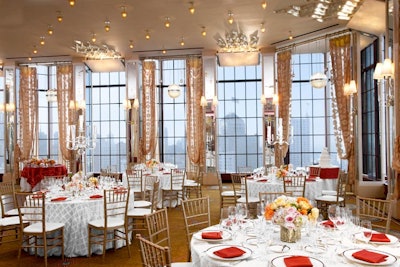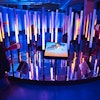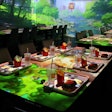
For the Los Angeles caterer Très L.A. Catering, California’s monthslong drought has brought with it changes to its menus.
“Quite a few farmers aren't able to produce some of the lettuces for our salads,” says Shruti Patel, chef de cuisine at Très L.A. “We have been bringing in different kind of greens to make due with the situation.”
California has been under a drought State of Emergency since January, enough time for caterers, banquet managers, and event planners to adapt their menus and adopt water-conservation strategies in their operations.
“Tomatoes, cilantro, eggs, and almost all beef have been hit the hardest, causing prices to go up and product to not be as good as it has been in the past,” Patel says. “We are now getting tomatoes and cilantro from certain farms that have temperature-controlled facilities and use an irrigation system that tends to water their crops in the early mornings and evenings. This way water isn't being wasted during the hottest parts of the day.”
At the Westin St. Francis hotel in San Francisco, hotel manager Craig Martin says his banquet staff haven’t had to make any food substitutions, but “as we see the trends start to occur, that’s definitely on the table.” Angela Souza, executive chef of the Hyatt Regency La Jolla at Aventine in San Diego, has also avoided making major alterations. "We really haven’t gone that deep to change menu items that are affected by the drought. We really just keep a close watch on quality in pricing in regards to meat and produce and see what items are trending higher," she says.
Instead, the staff at both hotels are engaged in water-conservation strategies. "We are just watching our water usage in regards to defrosting items, not wasting blanching water or ice and items like that," says Meredith Van der Walt, the Hyatt Regency La Jolla at Aventine's associate director of events.
During meetings, instead of pre-setting tables with bottled water or pitchers of water, the Westin St. Francis offers filtered water coolers in the back of the room. If planners want each table set with water, the hotel charges a fee of $5 per person—a new surcharge created in response to the drought.
“The surcharge really isn’t meant to be collected,” Martin says. “It’s meant to be a deterrent and help deliver the message to the meeting planner or group guest that water conservation is tremendous.”
In compliance with new state regulations, the Westin St. Francis no longer offers poured water at meals. It’s by-request only. Martin says his staff also now encourages planners to forgo table linens, saving the water that would have been used to launder them.
The measures might seem drastic or even inhospitable to some planners, so communicating why they are important has become part of the job.
“If you’re a meeting planner that’s within California, you’re very focused on it because it’s been in the news constantly on a day-to-day basis,” he says. “If you’re in another market, we do have to educate you slightly in terms of the changes in California.”
While most Californians are looking forward to the long dry spell to end, they won’t necessarily go back to life as usual. “These are long-term, lasting changes that will stay in effect,” Martin says.



















